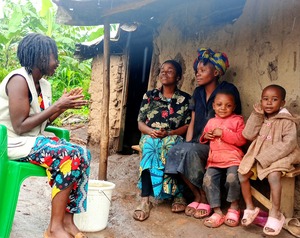Beatrice (not her real name) is a 49 years-old woman who fled to Uganda with her family to escape the instability in her home country, the Democratic Republic of Congo. Together with her daughter Rose (not her real name), a victim of sexual violence, she is attending psychosocial support sessions to help restore her self-acceptance and self-love.
Living with trauma
After arriving in Uganda, the traumatic experiences she had lived through in DRC still haunted Beatrice. She suffered from nightmares, sleepless nights and loss of appetite. She felt she had failed as a mother and was under great stress. She had lost hope.
Her only daughter, Rose, had been raped. Rose was struggling to cope with the consequences of the violence inflicted on her. She was feeling a lot of anger and was rude and aggressive with her siblings. After her rape, Rose gave birth to a child, but couldn’t find it in her heart to love him.
When Beatrice shared her issues with a friend of hers, this friend directed her to HI. Beatrice was welcomed by a psychosocial worker who assessed her and enrolled her in psychosocial support group. Beatrice convinced her daughter, Rose, to join as well. They were both enrolled in group sessions, where they joined other women who were experiencing similar or related psychological issues.
Finding acceptance and self-love
 The first session was about understanding stress and how to manage it, which was helpful to Beatrice. She learnt from other group members that she and her family were not alone in what they were going through, so she stopped blaming herself. Beatrice and Rose learnt techniques to use when they are stressed, such as finding someone to talk to, doing a breathing exercise and meeting up with other women. During the sessions, other members opened up about their struggles and it helped them a lot.
The first session was about understanding stress and how to manage it, which was helpful to Beatrice. She learnt from other group members that she and her family were not alone in what they were going through, so she stopped blaming herself. Beatrice and Rose learnt techniques to use when they are stressed, such as finding someone to talk to, doing a breathing exercise and meeting up with other women. During the sessions, other members opened up about their struggles and it helped them a lot.
After five support sessions, Beatrice and Rose’s psychosocial wellbeing was much improved.
“I was so happy to see my daughter smile for the first time in a long time,” Beatrice said. Rose recalls, “I couldn’t sleep without taking anti-depressants. I would shout at my siblings, I really hated my life before. Since going to these sessions, my relationship with my family has improved, I am friends with my mother and my siblings now. I have realised that I can’t change what happened to me, but I can learn to accept and love myself again.”
Life will get better with time
Beatrice says that Rose is now the one counselling her siblings at home. She has also become active again, doing chores, for example. Rose now talks, smiles, loves her child and sleeps well without anti-depressants. The whole family is now living harmoniously together. They have even started up a little catering business.
Beatrice is very appreciative of how the sessions have not only helped her, but her family as well. They can now discuss, smile and work together. She now believes that life will get better with time.
Through this project, funded by the European Union Humanitarian Aid, newly arrived asylum seekers and refugees from DRC and South Sudan, as well as their host communities, received protection and mental health support through access to protection, empowerment, accountability and leadership activities. Between May 2022 and February 2023, 2,006 people were given mental health and psycho-social support and 825 people received physical and functional rehabilitation assistance.


 The first session was about understanding stress and how to manage it, which was helpful to Beatrice. She learnt from other group members that she and her family were not alone in what they were going through, so she stopped blaming herself. Beatrice and Rose learnt techniques to use when they are stressed, such as finding someone to talk to, doing a breathing exercise and meeting up with other women. During the sessions, other members opened up about their struggles and it helped them a lot.
The first session was about understanding stress and how to manage it, which was helpful to Beatrice. She learnt from other group members that she and her family were not alone in what they were going through, so she stopped blaming herself. Beatrice and Rose learnt techniques to use when they are stressed, such as finding someone to talk to, doing a breathing exercise and meeting up with other women. During the sessions, other members opened up about their struggles and it helped them a lot.


